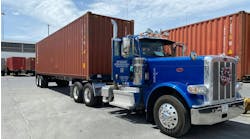Flexibility is becoming an extremely critical aspect of commercial truck financing. That’s because both fleets and their lenders are being compelled to seek financial solutions that take into account changing freight cycles—which are becoming both shorter and far more cyclical.
“We’re really not seeing changes to basic truck financial products; what we’re experiencing are changes in how they are applied,” Geoff Robinson Vice President -- Sales, Marketing and Remarketing for Daimler Truck Financial an arm of Germany-based Daimler Financial Services, told Fleet Owner.
“What we’re seeing is a much greater need for more ‘flexibility’ in financial arrangements, such as payment holidays, season payment plans, and the like – items now negotiated up front as part of the financial contract,” Robinson explained.
The need for more flexibility is driven by cash flow, which has become a real challenge to manage for many fleets, large and small, said Robinson. That in turn is leading many lenders in the trucking market to rework traditional financing plans – be they lease, rental, or straight commercial loans – into packages that take into account the new volatility of the freight market.
Noel Perry, managing director of FTR Associates and principal of research firm Transport Fundamentals, pointed out at FTR’s recent Transportation Conference that economic cycles going forward will be much shorter than in the past. That makes business decisions for everyone – but especially truckers – much more challenging. “We’re looking at short, deep cycles, so the window for [economic] recovery is now shortening from five years in the past to more like two years,” Perry said. “The freight cycle is now also very volatile – in fact 80% more volatile than in the past.”
As a result, lenders are reworking traditional financing structures to help fleets take advantage of short, sharp positive market upticks, pointed out Juergen Rochert, vp of Daimler Truck Financial USA. “For example, we’ll give a customer funding trucks through us 90 days until the first payment is due so they can have an opportunity to gain two to three months of freight revenue [from an up cycle],” he explained to Fleet Owner. “That’s a financing structure that allows the fleet to build up cash flow.”
Daimler’s Robinson said other such “practical” steps are being taken to help fleets expand their operations while minimizing the impact on cash flow. For instance, current customers seeking to upgrade to new equipment can get the pre-payment loan penalty waived if they are staying with Daimler Truck North America (DTNA) brands, such as Freightliner, Western Star, etc.
Robinson added that Daimler Truck Financial is also altering its used-truck rules to account for the growing dearth of late-model, low-mileage equipment on the market. “In the short term, we’ve seen 70% of our loan applications centering on used trucks as customers seek lower-cost equipment,” he said. “In the past, we only used to lend on used equipment with no more than 250,000 miles. Now we’re allowing up to 400,000 miles. We had to acknowledge the demand for used trucks and so modify our approach.”
Daimler’s Rochert added that such changes are only possible through more frequent communication with customers. “We’ve been out in the market more frequently now with customers, monitoring the business trends they are seeing, working with those that are proactive with us in explaining their needs in relation to market dynamics,” he noted. “Building such partnerships up front helps both parties [the fleet and the lender] in the long run.”



